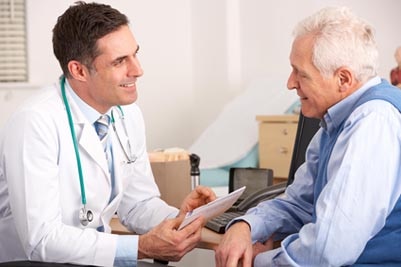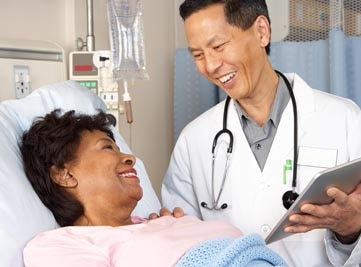Diverticular Disease
Return to Overview PageDefinition & Facts
In this section:
- What is diverticulosis?
- What is diverticulitis?
- What is diverticular disease?
- How common are diverticulosis, diverticulitis, and diverticular disease?
- Who is more likely to have diverticulosis, diverticulitis, and diverticular disease?
- What are the complications of diverticular disease?
What is diverticulosis?
Diverticulosis is a condition that occurs when small pouches, or sacs, form and push outward through weak spots in the wall of your colon. These pouches form mostly in the lower part of your colon, called the sigmoid colon.
One pouch is called a diverticulum. Multiple pouches are called diverticula. Most people who have diverticula in their colon do not have symptoms or problems. However, in some cases, diverticula may lead to symptoms or inflammation.
What is diverticulitis?
Diverticulitis occurs when diverticula become inflamed. Diverticulitis can come on suddenly and may lead to serious complications.
What is diverticular disease?
Diverticular disease occurs when diverticula lead to
- chronic symptoms
- diverticular bleeding
- diverticulitis or diverticulitis complications
How common are diverticulosis, diverticulitis, and diverticular disease?
Diverticulosis is quite common, especially as people age. More than 30% of U.S. adults between the ages of 50 and 59 and more than 70% of those older than age 80 have diverticulosis.1
Most people with diverticulosis will never develop symptoms or problems. Experts aren’t sure how many people with diverticulosis will develop symptoms if they do not have diverticulitis.
Less than 5% of people with diverticulosis develop diverticulitis.2 In the United States, about 200,000 people are hospitalized for diverticulitis each year.2 About 71,000 people are hospitalized for diverticular bleeding each year.3
Who is more likely to have diverticulosis, diverticulitis, and diverticular disease?
People are more likely to develop diverticulosis and diverticulitis as they age.
Among people younger than age 50, diverticulitis is more common in men than in women.2 However, among people ages 50 and older, diverticulitis is more common in women.2
Research suggests that, in the United States, diverticulitis is more common in white Americans than in other groups, and diverticular bleeding is more common in Black Americans than in other groups.3
What are the complications of diverticular disease?
Some people with diverticular disease may develop serious complications. For some people, complications may be the first sign of diverticular disease.
Diverticular bleeding
Diverticular bleeding occurs when a small blood vessel within the wall of a diverticulum pouch bursts. Diverticular bleeding is a common cause of bleeding in the lower digestive tract. The bleeding may be severe and life-threatening.
Diverticulitis complications
Diverticulitis may lead to complications such as
- abscess, a painful, swollen, pus-filled area caused by infection
- fistula, an abnormal passage or tunnel between the colon and another part of the body, such as the bladder or vagina
- intestinal obstruction, a partial or total blockage of the movement of food, fluids, air, or stool through your intestines
- perforation, or a hole, in your colon
- peritonitis, an infection of the lining of the abdominal cavity
References
Symptoms & Causes
What are the symptoms of diverticular disease?
Symptoms of diverticular disease depend on whether diverticula—pouches in the wall of the colon—lead to chronic symptoms of diverticula, diverticular bleeding, or diverticulitis. Most people first notice symptoms when they develop complications, such as diverticular bleeding or diverticulitis.
Chronic symptoms of diverticula
Some people have chronic symptoms related to diverticula, even when diverticulitis is not present. Chronic symptoms may include
- bloating
- constipation or diarrhea
- cramping or pain in the lower abdomen
Other conditions, such as irritable bowel syndrome, cause similar symptoms, so having these symptoms may not mean you have diverticular disease. If you have these symptoms, see your doctor.
 See your doctor if you have symptoms such as bloating, constipation or diarrhea, or pain in your lower abdomen.
See your doctor if you have symptoms such as bloating, constipation or diarrhea, or pain in your lower abdomen.
Diverticulitis
Diverticulitis may cause acute symptoms such as
- abdominal pain, most often in the lower left side of your abdomen
- constipation or diarrhea
- fevers and chills
- nausea or vomiting
The pain caused by diverticulitis is typically severe and comes on suddenly, although the pain may also be mild and worsen over several days. The intensity of the pain may change over time.
What causes diverticular disease?
Doctors aren’t sure what causes diverticular disease. Experts think the following factors may play a role in causing or increasing the risk for this disease.
Genes
Research suggests that certain genes may make some people more likely to develop diverticular disease.
Lifestyle factors
Certain lifestyle factors may increase the risk of diverticulitis or complications of diverticular disease, including
- diets low in fiber and high in red meat
- lack of physical activity
- medicines such as nonsteroidal anti-inflammatory drugs (NSAIDs) and steroids
- obesity
- smoking
Other factors
Scientists are studying other factors that may play a role in diverticular disease. These factors include
- bacteria or stool getting caught in a pouch in your colon
- changes in the microbiome of the intestines
- problems with connective tissue, muscles, or nerves in your colon
- problems with the immune system
Diagnosis
How do doctors diagnose diverticular disease?
To diagnose diverticular disease, doctors review your medical history, perform a physical exam, and order tests.
In some cases, doctors may notice pouches in the colon wall while performing tests, such as
x-rays or a colonoscopy, for another reason. If you have pouches in the wall of your colon but don’t have related symptoms, your doctor may diagnose diverticulosis rather than diverticular disease.
Medical history
Your doctor will ask about your medical history, including your symptoms, bowel movement patterns, what you eat and drink, medical conditions, and what medicines you take.
Physical exam
During a physical exam, your doctor may
- check your blood pressure, heart rate, and temperature
- press on your abdomen to feel for tenderness or masses
- use a stethoscope to listen to sounds within your abdomen
The physical exam may also include a digital rectal exam.
What tests do doctors use to diagnose diverticular disease?
Doctors may order blood tests, a stool test, imaging tests, and a colonoscopy to help diagnose diverticular disease.
Blood tests
A health care professional will take a blood sample from you and send the sample to a lab. Doctors may use blood tests to check for signs of diverticulitis or its complications.
Stool test
Doctors may order a stool test to help find out if you have diverticular disease or another health problem, such as irritable bowel syndrome. Your doctor will give you a container for catching and holding a stool sample. You will receive instructions on where to send or take the kit for testing.
Imaging tests
Doctors typically diagnose diverticular disease with imaging tests, such as
- computed tomography (CT), which uses a combination of x-rays and computer technology to create images
- ultrasound, which uses sound waves to create an image of your organs
- magnetic resonance imaging (MRI), which takes pictures of your body’s internal organs and soft tissues without using x-rays
Colonoscopy
Doctors may recommend a colonoscopy to confirm a diagnosis of diverticular disease and rule out other conditions, such as cancer. Doctors may also order a colonoscopy to see and treat diverticular bleeding.
During a colonoscopy, doctors use a colonoscope or scope—a long, flexible, narrow tube with a light and a tiny camera on one end—to view the lining of the rectum and colon.
Treatment
How do doctors treat diverticular disease?
Your doctor will recommend treatments based on whether you have chronic symptoms of diverticula, diverticulitis, or other complications of diverticular disease.
Chronic symptoms of diverticula
If diverticula cause chronic symptoms, your doctor may recommend one or more treatments, such as
- high-fiber foods or fiber supplements
- antibiotics
- medicines to reduce inflammation
- probiotics
For safety reasons, talk with your doctor before using probiotics or any complementary or alternative medicines or medical practices.
Diverticulitis
For people who have diverticulitis without complications, doctors may recommend treatment at home. However, people typically need treatment in a hospital if they have severe diverticulitis, diverticulitis with complications, or a high risk for complications.
Treatments for diverticulitis may include
- antibiotics, although not all people with diverticulitis need these medicines.
- a clear liquid diet for a short time to rest the colon. Your doctor may suggest slowly adding solid foods to your diet as your symptoms improve.
- medicines for pain. Doctors may recommend antispasmodics or acetaminophen instead of nonsteroidal anti-inflammatory drugs (NSAIDs). NSAIDs may increase the chance of diverticulitis complications.
If your diverticulitis doesn’t improve with treatment or if it leads to complications, you may need surgery to remove part of your colon, called a colectomy or colon resection.
How do doctors treat the complications of diverticular disease?
Doctors typically treat the complications of diverticular disease in a hospital.
Diverticular bleeding
If you have bleeding from your rectum—even a small amount—you should see a doctor right away. In some cases, diverticular bleeding may stop by itself and may not require treatment. In other cases, doctors may need to find the source of the diverticular bleeding and stop it, or give blood transfusions if a lot of blood has been lost.
Doctors can find and stop diverticular bleeding with procedures such as
- colonoscopy. During a colonoscopy, a doctor can insert special tools through the colonoscope to stop the bleeding.
- angiogram, a special kind of x-ray that uses dye to detect blood vessels in the colon. During an angiogram, a radiologist can inject medicines or other materials into blood vessels to stop the bleeding.
- surgery.
Diverticulitis complications
 Doctors typically treat the complications of diverticular disease in a hospital.
Doctors typically treat the complications of diverticular disease in a hospital.
Doctors may recommend different treatments for abscesses. Doctors may
- prescribe antibiotics to treat small abscesses
- drain abscesses that are large or don’t improve with antibiotics
- recommend surgery after a large abscess heals, to prevent the abscess from coming back
Doctors typically recommend surgery to treat other diverticulitis complications, including
Can I prevent diverticulitis?
In some cases, doctors may recommend lifestyle changes or surgery to prevent diverticulitis.
Lifestyle changes
Research suggests that certain lifestyle factors may lower the risk of developing diverticulitis. These factors include
- eating a diet high in fiber and low in red meat
- being physically active on a regular basis
- not smoking, or quitting smoking if you smoke
- reaching and maintaining a healthy weight
Talk with your doctor about whether you should take steps to lower your risk of diverticulitis.
If you had diverticulitis in the past, talk with your doctor about whether lifestyle changes may lower your chance of having diverticulitis again. Also, talk with your doctor about the medicines you take and whether they could increase your risk of diverticulitis.
Surgery
In some cases, after a person has diverticulitis without complications, doctors may recommend surgery to remove part of the colon and prevent diverticulitis from occurring again. Whether a doctor recommends surgery depends on the person’s history of diverticulitis, health conditions, and other factors.
Eating, Diet, & Nutrition
Does what you eat and drink play a role in causing or preventing diverticular disease?
Research suggests that a diet low in fiber and high in red meat may increase your risk of getting diverticulitis—inflammation of one or a few pouches in the wall of your colon. Eating high-fiber foods and eating less red meat may lower the risk.
The Dietary Guidelines for Americans, 2020–2025, recommends a dietary fiber intake of 14 grams per 1,000 calories consumed. For example, for a 2,000-calorie diet, the fiber recommendation is 28 grams per day.
What should I eat and drink if I have diverticular disease?
If you have chronic symptoms of diverticular disease or if you had diverticulitis in the past, your doctor may recommend eating more foods that are high in fiber.
 Your doctor may recommend eating more foods that are high in fiber.
Your doctor may recommend eating more foods that are high in fiber.
Talk with a health care professional, such as your doctor or a dietitian, to plan meals with the right amount of fiber for you. Health care professionals may recommend increasing the amount of fiber you eat a little at a time, so your body gets used to the change.
The amount of fiber in a portion of food is listed on the food’s Nutrition Facts label. Some examples of fiber-rich foods are listed in the table below.
Examples of fiber-rich foods
| Grains | |
|---|---|
| Food and Portion Size | Amount of Fiber |
| 1/2 cup of ready-to-eat cereal, high fiber, unsweetened | 14.0 grams |
| 1/2 cup of bulgur, cooked | 4.1 grams |
| 1 ounce of crackers, whole wheat | 2.9 grams |
| 1 ounce of tortillas, whole wheat | 2.8 grams |
| Fruits | |
|---|---|
| Food and Portion Size | Amount of Fiber |
| 1 cup of raspberries | 8.0 grams |
| 1 medium Asian pear | 6.5 grams |
| 1 medium apple, with skin | 4.8 grams |
| 1/4 cup of prunes or dried plums | 3.1 grams |
| Vegetables | |
|---|---|
| Food and Portion Size | Amount of Fiber |
| 1 cup of green peas, cooked | 8.8 grams |
| 1/2 cup of lentils, cooked | 7.8 grams |
| 1/2 cup of pinto beans, cooked | 7.7 grams |
| 1 cup of sweet potato, cooked | 6.3 grams |
| 1/2 cup of chickpeas (garbanzo beans), cooked | 6.3 grams |
| 1/2 cup of kidney beans, cooked | 5.7 grams |
| 1 cup of broccoli, cooked | 5.2 grams |
| 1 cup of collard greens, cooked | 4.8 grams |
Should I avoid certain foods if I have diverticulosis or diverticular disease?
Most people with diverticulosis or diverticular disease do not need to avoid specific foods. In the past, doctors used to recommend avoiding nuts, popcorn, and seeds. However, more recent research suggests that these foods are not harmful to people with diverticulosis or diverticular disease.
If you have diverticulosis or diverticular disease, talk with your doctor about whether you should change what you eat and drink.
Clinical Trials
The NIDDK conducts and supports clinical trials in many diseases and conditions, including digestive diseases. The trials look to find new ways to prevent, detect, or treat disease and improve quality of life.
What are clinical trials for diverticular disease?
Clinical trials—and other types of clinical studies—are part of medical research and involve people like you. When you volunteer to take part in a clinical study, you help doctors and researchers learn more about disease and improve health care for people in the future.
Researchers are studying many aspects of diverticular disease, such as
- how doctors and patients make decisions about elective surgery for diverticulitis, and how treatment decisions affect quality of life
- how health care professionals in emergency departments can best manage patients with diverticulitis
Find out if clinical studies are right for you.
Watch a video of NIDDK Director Dr. Griffin P. Rodgers explaining the importance of participating in clinical trials.
What clinical studies for diverticular disease are looking for participants?
You can view a filtered list of clinical studies on diverticular disease that are federally funded, open, and recruiting at ClinicalTrials.gov. You can expand or narrow the list to include clinical studies from industry, universities, and individuals; however, the NIH does not review these studies and cannot ensure they are safe. Always talk with your health care provider before you participate in a clinical study.
This content is provided as a service of the National Institute of Diabetes and Digestive and Kidney Diseases
(NIDDK), part of the National Institutes of Health. NIDDK translates and disseminates research findings to increase knowledge and understanding about health and disease among patients, health professionals, and the public. Content produced by NIDDK is carefully reviewed by NIDDK scientists and other experts.
The NIDDK would like to thank:
Lisa L. Strate, M.D., M.P.H., University of Washington School of Medicine, Harborview Medical Center
